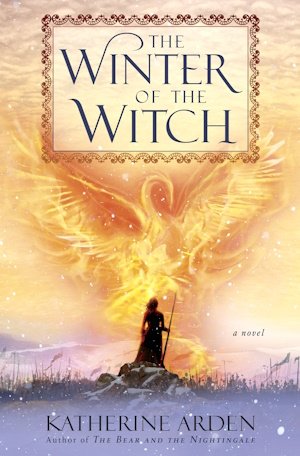He went out into the dooryard, and raised his face to the night. For an instant, the wind was the true deep wind of winter that freezes the breath in your nostrils.
Suddenly he turned back to her, and the feeling was there again in his face, as though he could not help it.
“Be well, and do not forget, Snegurochka,” he said.
“I will not. Morozko—”
He was only half there; the wind seemed to blow through him.
“As I could, I loved you too,” she whispered.
Their eyes met. Then he was gone, gone on the rising wind, blown through the wild air.
25.
The Road Through Darkness
SASHA AND VASYA LEFT JUST before midnight.
“I am sorry,” Sasha said to Olga before they left. “For what I said, at our last parting.”
Olga almost smiled, but the corners of her mouth turned down. “I was angry too. You’d think I’d be used to farewells, brother.”
“If it goes ill for us in the south,” said Sasha, “you mustn’t stay in Moscow. Take the children to Lesnaya Zemlya.”
“I know,” said the Princess of Serpukhov, and brother and sister exchanged grim glances. Olga had lived through three sieges; Sasha had been fighting Dmitrii’s battles since the two were scarcely out of boyhood.
Watching them, Vasya was reminded, uncomfortably, that though she had seen much, she had never seen war.
“Go with God, both of you,” said Olga.
Vasya and Sasha slipped out of Moscow. Below the gate, the posad slept. The swift, cold wind had driven out the reek of sickness. At least the dead would lie quiet.
Vasya led her brother into the woods, to the same place where Varvara had first sent her through Midnight—how long ago had it
been? Two seasons had passed in Rus’ since that night, but Vasya had lost count of the days she’d lived herself.
Somewhere in Moscow, a bell rang. The city walls loomed white beyond the trees. Vasya took her brother’s hand. It was midnight.
The darkness took on a wilder texture: a new menace and a deeper beauty. She stepped forward, pulling her brother with her. “Think of our cousin,” she said. One step, two, and then Sasha let out a soft, shocked breath.
Moscow was gone. They stood in a sparse elm-copse, dry and warm. There was dust instead of mud between Vasya’s bare toes, and the big late-summer stars hung low overhead. A different midnight.
“Mother of God,” Sasha whispered. “These are the woods near Serpukhov.”
“I told you,” said Vasya. “It is a swift road, but—” She broke off.
The black stallion Voron emerged from between two trees. His rider’s morning-star eyes glowed in the darkness.
Sasha’s hand went to the hilt of his sword. Perhaps the country of Midnight had wakened something in his blood, for he could see horse and rider. “That is Lady Midnight,” said Vasya, not taking her eyes off the chyert. “This is her realm.” She inclined her head.
Sasha crossed himself. Polunochnitsa smiled at him, mocking, and slid down from her horse’s back.
“God be with you,” Sasha said, cautiously.
“I certainly hope not,” returned Polunochnitsa. Voron tossed his black head, his ears set unhappily. Turning to Vasya, Midnight said,
“In my realm again? And proud of your victory?”
“We did win,” Vasya said, wary.
“No,” said Midnight. “You didn’t. What do you think the real battle is, you arrogant fool? You never understood, did you?”
Vasya said nothing.
Between her teeth, Midnight said, “We hoped— I hoped—that you were different. That you would break their endless round of revenge and imprisonment. But you encouraged their war, those idiot twins.”
“What are you talking about?” Vasya demanded. “We saved Moscow from the dead. I do not know why you are angry. He is wicked, the Bear. Wicked. Now he is bound. Rus’ is safe.”
“Is it?” Midnight asked. “You still don’t understand.” Fury and disgust and—disappointment—snapped in her eyes. “You cannot rule the chyerti, or keep the house by the lake, or save us from fading out of life. You failed. The way to the lake is shut to you; I am shutting it, and risking the old woman’s wrath. She will have no heir. Farewell, Vasilisa Petrovna.”
Then she was gone fast as she’d appeared, a whirl of pale hair, vaulting to Voron’s back. The last Vasya heard of her was the sound of fading hoofbeats. Shaken, Vasya stared at the place where she’d been. Sasha looked merely puzzled. “What did that mean?”
“I do not understand why she is angry,” said Vasya. But she was uneasy. “We have to go on. Follow me close. We must not be separated.”
They walked cautiously, for Vasya feared Midnight’s anger, in this place of her power. Sasha followed her, starting at shadows, bewildered by the changing nights. But still he followed her. He trusted her.
Vasya blamed herself, later.

























